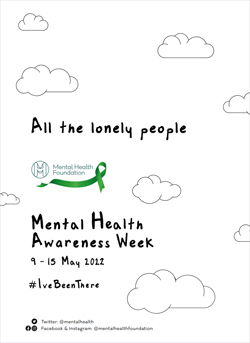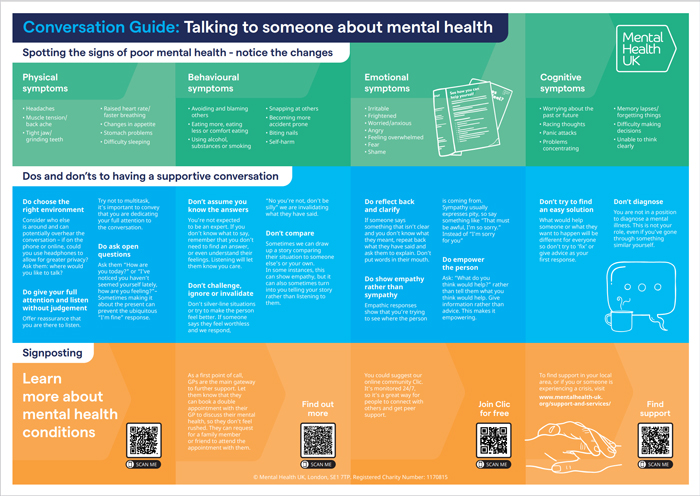 |
|
|
|
"Loneliness is a cloak you wear" In this year's Mental Health Awareness Week, the theme of Loneliness comes from a new report from the Mental Health Foundation which shows just how many people suffer from this form of mental health condition.
The week will explore the experience of loneliness, its effect on our mental health and how we can all play a part in reducing loneliness in our communities and workplaces. A new study commissioned by Mental Health UK which took place last month has been published which shows that Loneliness affects millions of people in the UK every year and is a key driver of poor mental health. The study which was conducted last month (April 2022) involved a sample size of 2,023 adults about their experiences of loneliness in the workplace, and how it could affect their mental health. The figures have been weighted and are representative of all GB adults (aged 18+). The report includes some practical guidance on how to tackle loneliness in your workplace. The reports summary says: 'We all know what loneliness feels like. Feeling lonely from time to time is a normal part of life. But when loneliness is severe or lasts a long time, it can negatively affect our mental health. The full report can be downloaded from both the Unionsafety E-Library and by clicking on the image of the front cover below right. "Long term loneliness can be totally debilitating." says unionsafety web editor Chris Ingram.
Remembering a song from the 1960s pop band, the Walker Brothers, as being one of his favourite and supportive songs from his youth, Chris explained: " Loneliness is something a person does not have to be literally alone to experience. It so often is a 'state of mind' and has many origins and causes. Music has always been a comforting source to me, especially as a child and young adult. The Walker Brothers had a big hit with 'The Sun Ain't Gonna Shine Anymore', with an opening line of words that touched me as soon as I heard them. 'Loneliness is a cloak you were...' which I knew so much as being very true in the way it covered my mind and my thoughts. And one which has the ability to allow you hide behind, stopping people from seeing how you truly feel. I actually found it in some ways comforting because the words actually expressed understanding of the condition, and that what I was feeling was not unique to just me. At a time when going for walks with a portable radio in your hand was an everyday occurrence for many people; it was something I would do. That song is one I would listen to on the radio, and play at home alone in my room. To this day, the pertinence of this week's Mental health Awareness Week is not lost on me. Indeed I can honestly say, that I have felt lonely for many years in my life." The Unionsafety web editor says that many who have experienced 'loneliness' can testify to the fact that this condition can lead to anxiety and depression, curtail creativity and cause one to feel that every bad day of 'loneliness', will remain the experience of everyday from here on in. It can stunt the way your rationale works, and make everyday tasks difficult and tiring. Worst of all it can become a self-fulfilling prophesy of your future condition and state of mind each day. Loneliness, can be so all encumbering, that it can lead to physical pain.
They're only too aware that mental health problems can be exacerbated and result into darker thoughts of uselessness, hopelessness there being no way out; and become a conduit even for suicidal thoughts. At best, it can often become a permanent status for a person who feels lonely and unable to connect to anyone everyday, even at work. In the North West, there exists a network of CWU Mental Health First Aiders in workplaces that can be tapped into by those in need of support and help in finding professional help and treatment if required to help sufferers to live with their condition and ensure it does not become a permanent feature of their everyday lives. Some times a sufferer's work colleagues or friends and family members can help once they are either aware of how an individual is feeling or the person suffering is able to express the pain of how they feel. The Week's theme and encouragement to connect with one another can be the means to finally get or give the support needed, and help to end loneliness. Loneliness does not have to be a permanent status of existence. The CWU's National Health, Safety, and Environment Officer Dave Joyce, wrote to all the Union's Branches this week via letter to branches LTB219/22: 'Research has found that loneliness has been exacerbated by the Covid pandemic. MHF has been tracking loneliness levels in the UK during the pandemic and found the experience has been much higher with devastating impact. Loneliness has been an important factor contributing to higher levels of distress, resulting from people’s sense of isolation and reduced ability to connect with others. Further findings were that loneliness was one of the leading issues that the public felt needed to be addressed. The aim of Mental Health Awareness Week is to raise awareness of the impact of loneliness on people’s mental health and wellbeing and the practical steps that can be taken to address it. Reducing loneliness is a major step towards a mentally healthy society.' Dave's letter to CWU Branches continues: 'The message is – Let’s connect during Mental Health Awareness Week, and together;
Help people to understand links between loneliness and poor mental health, and actively check in on those around you at work and in your communities.
Foster conversations about mental health – see attached conversation guide ‘talking to someone about mental health.’
Every little bit counts.
To those in need of advice, representation or sign-posting to professional help or counselling etc. Dave's LTB provides further background to the report: Mental Health UK New Research into loneliness at work – Loneliness and our mental health at work (Mental Health UK/YouGov Study) – 1 in 5 workers feel lonely at work Loneliness can affect many of us at one time or another and we can encounter it in different walks of life. One in five workers feel lonely at work on a typical working day. This report contains information about loneliness at work, how loneliness can affect our mental health, and practical advice for supporting work colleagues who may be experiencing loneliness. UK Society and workplaces have changed in recent years. Employers and work colleagues have embraced flexible ways of working for the better, allowing for greater face time with friends, family, and housemates outside of work – but what has this meant for our connections at work? The full, including attachments, LTB219/22 is available to download here Source: CWU / Mental Health Foundation /Chris Ingram / unionsafety See also: The Unionsafety E-Library for mental health information, advice and reports by suing the search category ' mental health'.
|


 "Sadly too many of us have experienced this in our lives at some time or other, and as with everything else about mental health conditions, those suffering learn to hide it extremely well. They suffer in silence!"
"Sadly too many of us have experienced this in our lives at some time or other, and as with everything else about mental health conditions, those suffering learn to hide it extremely well. They suffer in silence!"
 We need you to:
We need you to: 